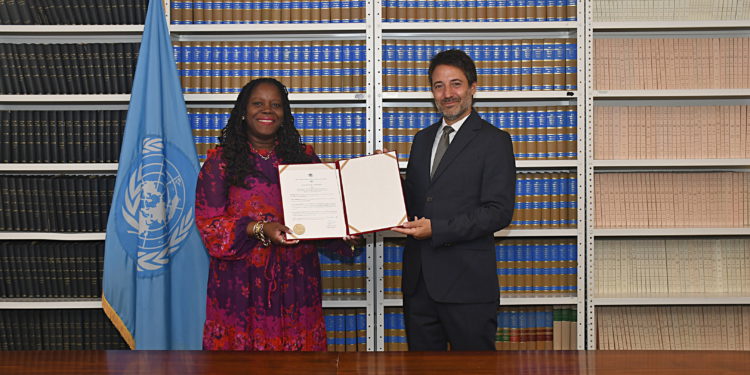United Nations, New York (4 September 2025) – In a brief yet significant and emblematic ceremony at the United Nation’s Treaty Office in New York on 29 August 2025, St. Kitts and Nevis deposited its instruments of acceptance for the Kigali Amendment signaling the nation’s continued commitment to combatting global climate change, and multilateralism.
Adopted in October 2016 in Kigali Rwanda, under the Montreal Protocol, a UN treaty successfully used to protect the ozone layer by phasing out chlorofluorocarbons (CFCs), the Kigali Amendment, addresses a significant yet overlooked source of climate change, hydrofluorocarbons (HFCs). While not ozone depleting, HFCs are powerful greenhouse gases that trap heat thousand times more effectively than carbon dioxide, making their reduction crucial for climate action.
St. Kitts and Nevis’ Permanent Representative and Ambassador to the United Nations, Dr. Mutryce Williams said, “St. Kitts and Nevis is a small island developing state. Although SIDS are responsible for less than 1% of global greenhouse gas emissions, we are disproportionately affected by the climate crisis. We are susceptible to climate change: sea-level rise, intense weather such as hurricanes and rising ocean temperatures. Signing the Kigali Amendment is crucial as it helps to mitigate climate change, which poses an existential threat to our nation. The aim of the Amendment is to curb the global temperature rise, directly protecting vulnerable SIDS such as our nation from the devastating effects of warming.”
She continued, “The ratification of the Kigali Amendment further demonstrates St. Kitts and Nevis’ dedication to addressing the impact of climate change. It also aligns with our broader commitment to energy resiliency and energy sovereignty. Through our Sustainable Island State Agenda (SISA), championed by the Honourable Prime Minister Dr. Terrance Drew and his administration, capably led by Minister of Sustainable Development, Environment, and Climate Action the Honourable Dr. Joyelle Clarke, St. Kitts and Nevis has pledged to develop national strategies and institutional strengthening so that our nation may be at the forefront in combatting climate change.”
At their 28th Meeting, the Parties to the Montreal Protocol adopted the Kigali Amendment, an international agreement that mandates a global phase-down of hydrofluorocarbons (HFSs), potent greenhouse gases used in refrigeration and air conditioning, to reduce global warming. The Amendment which came into effect on 1st January 2019 complements existing climate goals like the Paris Agreement by addressing a significant yet often overlooked source of climate change.
The Kigali Amendment aims to prevent up to 0.5 degrees Celsius of warming by 2100 by requiring developed and developing countries to reduce HFC production and consumption by 80-85% by 2047. The Amendment also promotes innovation as it encourages the development and adoption of new, lower-global warming potential alternative technologies.









